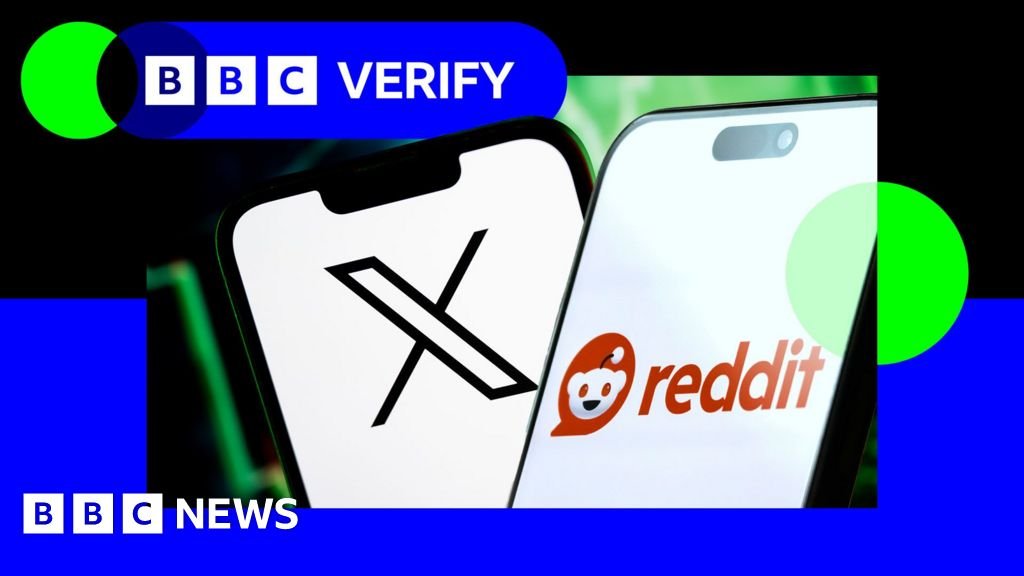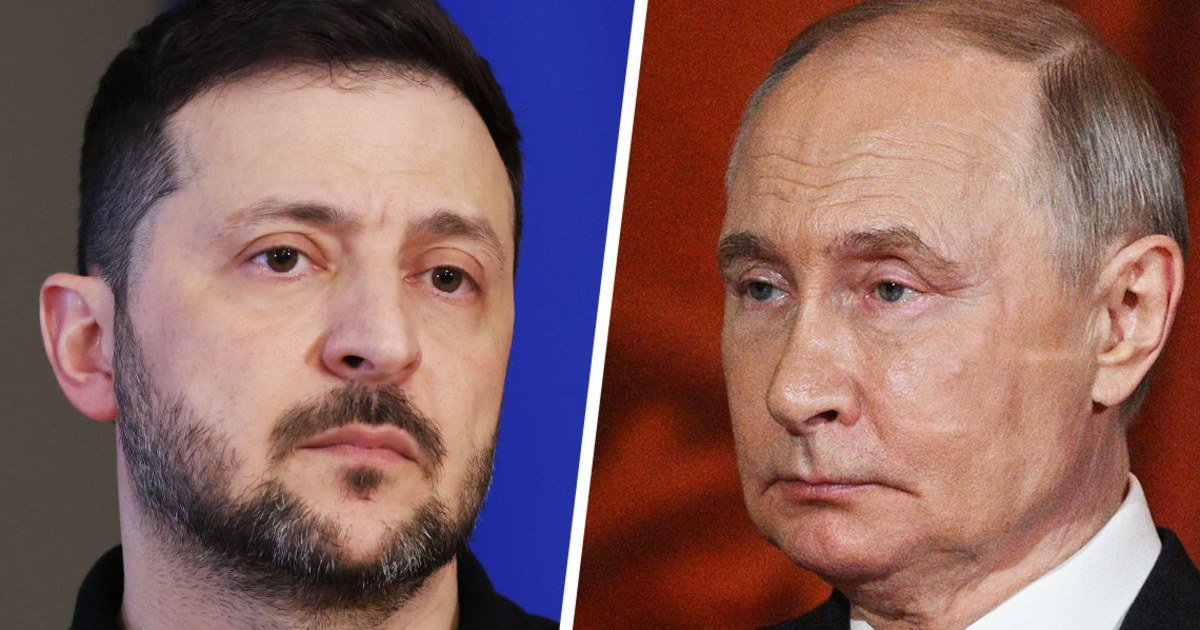Social media companies are blocking wide-ranging content – including posts about the wars in Ukraine and Gaza – in an attempt to comply with the UK's new Online Safety Act, BBC Verify has found.
The new legislation, which came into effect last Friday, imposes fines on social media companies and other websites which fail to protect under-18s from pornography, posts promoting self-harm, and other harmful content. In serious cases, services could be blocked in the UK.
But BBC Verify found a range of public interest content, including parliamentary debates on grooming gangs, has been restricted on X and Reddit for those who have not completed age verification checks.
Experts warn companies are risking stifling legitimate public debate by overapplying the law.
Sandra Wachter, a professor of technology and regulation at the Oxford Internet Institute, expressed alarm at the restrictions and told BBC Verify that the new bill was "not supposed to be used to suppress facts of public interest, even if uncomfortable".
Organisations can be fined up to £18m or 10% of their global revenue if they are found to have failed to stop harmful content appearing on their platforms. Under the act harmful content includes posts containing pornography, or any which encourage self-harm, eating disorders or promote violence.
Professor Sonia Livingstone – an expert in children's digital rights at the London School of Economics – said that companies might "get better over time at not blocking public interest content while also protecting children" as the law beds in over time.
Among the restricted content identified by BBC Verify was a video post on X which showed a man in Gaza looking for the dead bodies of his family buried among the rubble of destroyed buildings. The post was restricted despite not showing any graphic imagery or bodies at any point in the clip. X subsequently removed the warning after being approached by BBC Verify.
When users who had not verified their age attempted to access the post they were met with a message reading: "Due to local laws, we are temporarily restricting access to this content until X estimates your age."
The same warning was experienced by users who attempted to view a video of a Shahed drone destroyed mid-flight in Ukraine. The Iranian-made drones, which are widely used by Russia in the full-scale invasion, are unmanned and nobody was injured or killed in the clip.
Reddit has introduced similar restrictions. The platform, which hosts countless communities which discuss major news events, now requires age checks for some groups when users try to access them via search engines.
Among the Reddit communities which have been restricted is one called R/UkraineConflict, a message board with 48,000 members that frequently posts footage of the war. Similar restrictions, which urge users to "log in to confirm your age", have been imposed on several pages which discuss the Israel-Gaza war and communities which focus on healthcare.
Meanwhile, clips of parliamentary debates have also been swept up in the restrictions. A speech by Conservative MP Katie Lam, containing a graphic description of the rape of a minor by a grooming gang, is available to view without restriction on Parliament's official streaming website, ParliamentLive, but is restricted on X.
Lam, who was elected in 2024, wrote on social media: "The British state won't protect children from mass gang rape. But it will 'protect' adults from hearing about it."
Another post restricted on X shared an image of Francisco de Goya's 19th-century painting entitled Saturn Devouring His Son. The striking work depicts the Greek myth of the Titan Cronus – known as Saturn by the Romans – eating one of his children in fear of a prophesy that one would overthrow him and has been described as depicting "utter male fury".
The examples gathered by BBC Verify are largely focussed on X and Reddit, as they clearly flag age-restricted content. Meta has a different system whereby 'teen' profiles are a different type of account with parental control – making it harder for us to identify which content is age-restricted.
It is unclear exactly how many posts commenting on debates of public interest are being restricted. X and Reddit did not respond to a request for comment.
But Prof Livingstone noted that it was "possible that the companies are over-blocking to undermine the Act".
X owner Elon Musk has been highly critical of the Online Safety Act. The billionaire has launched a stream of attacks against the legislation online and X suggested that it could dissuade companies from launching products in the UK.
"[The law's] purpose is suppression of the people," Musk wrote on X on Monday, before sharing several posts by the far-right activist Tommy Robinson which also opposed the law.
Data suggests that the legislation could heavily impact adults in the UK. Large proportions of users – up to 37% on X and 59% on Reddit – access these platforms whilst logged out, according to data from the platforms. This means those users won't be age-verified and will experience the internet in the same way as children.
The Department of Science, Innovation and Technology (DSIT) emphasised to BBC Verify that it was up to social media platforms themselves to decide how to implement the requirements of the act, but insisted that the risk-based approach must not "censor political debate".
Ofcom, the UK media regulator tasked with enforcing the act, has warned that firms could face fines not only for failing to protect children, but also for breaching freedom of speech under the act.
BBC Verify's analysis also suggested that the legislation had succeeded in blocking some harmful material online. Since Musk bought X, previously called Twitter, the platform has earned a reputation for being flooded with pornographic material, as well violent, antisemitic and racist posts.
However, we found that violent and pornographic content was significantly restricted when using an account without age verification.
The new obligations effectively puts firms in a position where they must comply with the law. Prof Livingstone suggested that they could still be in a period of "working out how best" to make judgements over the sort of content on their sites, which could be refined over time.
But Prof Wachter said that the level of self-regulation afforded to tech companies in choosing how to comply with the Online Safety Act called for well-staffed moderation teams equipped with "time, resources, expertise and nuance" to effectively make decisions.
She also noted that many major social media companies, such as X and Meta, have slimmed down their moderation teams in recent years or dissolved them completely.
"This trend is very worrying when opaque rules are now applied to make these take down decisions, especially in the current political climate," Prof Wachter said.
What do you want BBC Verify to investigate?
It is hoped the deal will lead to more consumer choice and less disruption.
Screen time has become synonymous with bad news – but the science may not be as straightforward as it seems
It comes after a hack which exposed thousands of members' images, posts and comments.
It comes after the Prime Minister said recognition is conditional on Israel's actions.
Swan Youth project in Berkhamsted's workshops tackling dealing with rejection and toxic masculinity
Copyright 2025 BBC. All rights reserved. The BBC is not responsible for the content of external sites. Read about our approach to external linking.
Tech giants blocking some Ukraine and Gaza posts under new online rules – BBC



